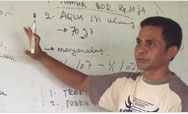Faith-Based and Community Initiatives

President Bush created the Center for Faith-Based and Community Initiatives (CFBCI) at USAID in December
2002. USAID's Center seeks to create a level playing field for faith-based and community groups to compete for USAID programs. The initiative also reaches out to faith-based and other community organizations to increase their access to and knowledge of U.S. Government funding sources. Finally, CFBCI addresses legal and policy issues and educates USAID staff about the initiative.
- CFBCI highlights demonstration projects that showcase the effectiveness of USAID's faith-based and community partners.
- CFBCI meets regularly with faith-based and community organizations and has developed an email list of approximately 1,200 members.

Bringing Mechanized Farming to the Nuba Mountains
In the Nuba Mountains of Sudan, individual farmers were not able to produce enough food to feed their families. In 2003, the tribal elders approached Samaritan's Purse (www.samaritanspurse.org), a faith-based organization, and asked for help to create a large community farm.
Samaritan's Purse partnered with USAID's Office of U.S. Foreign Disaster Assistance (USAID/OFDA) to develop a program of mechanized farming. Within three months, 70 families cleared and prepared 140 acres of fertile land in their valley. They removed all of the scrub brush and rocks to create an area that was conducive to mechanized farming.
Samaritan's Purse used OFDA funds to purchase six tractors and the necessary equipment to operate on large fields. The harvest was large enough not only to ensure the food security of families but also to enable some of them to sell sorghum on the local market. Because of the harsh growing conditions, this was the only surplus grain produced in the region.
The continued support of the mechanized farming project is helping to substantially improve the poor farming techniques of the Nuba people by showing them how much more can be produced with different methods. It is also creating food security for many families that could not support themselves without some outside assistance.
- Educating USAID/Washington and field staff about the role faith-based and community organizations can play in meeting development objectives is critical.
- Providing technical assistance for new and potential partners is important for a level playing field.
- Communicating regularly with faith-based and community groups about conferences, funding opportunities, and regulations regarding provision of U.S. Government assistance is essential.
Note: Results for this initiative were reported through USAID's consolidated reporting system
Back to Top ^
|


